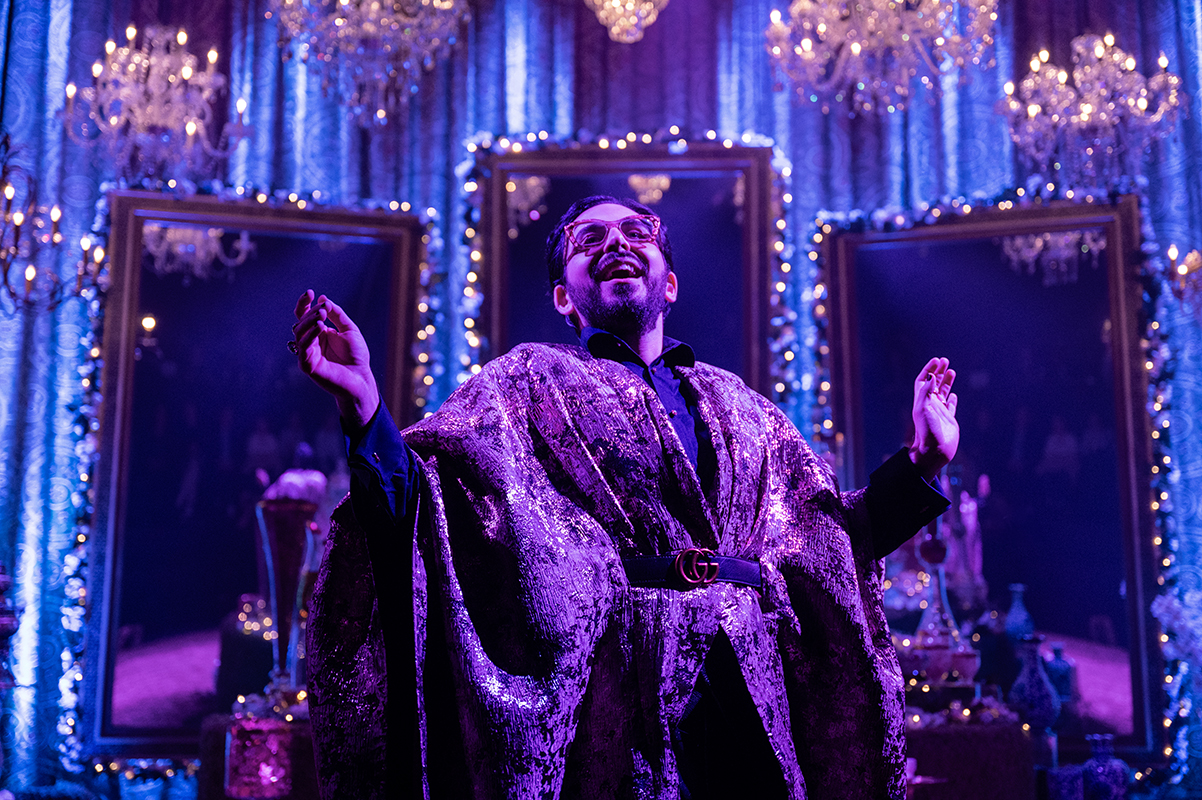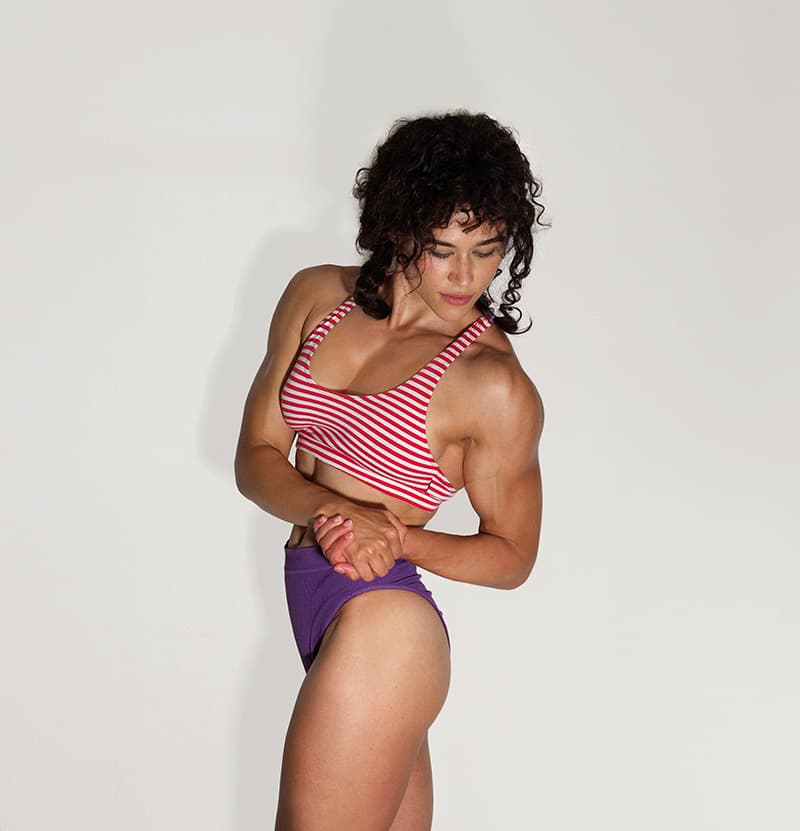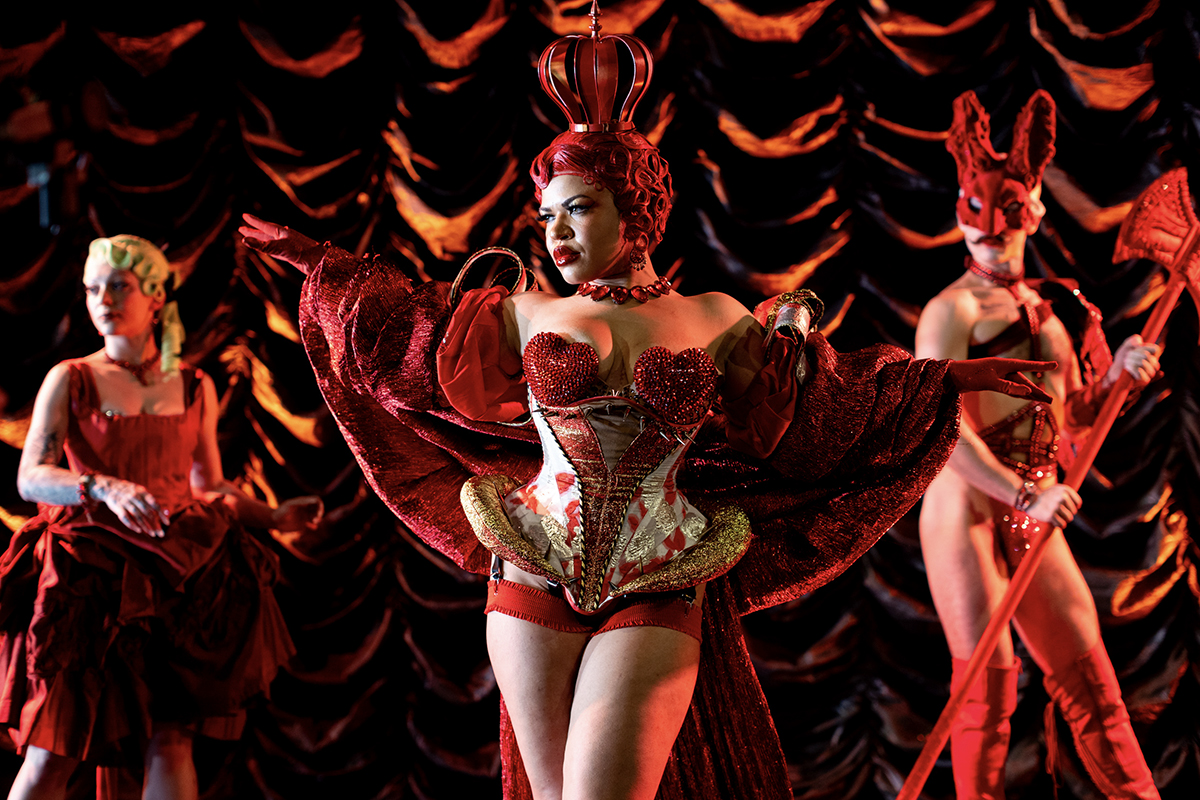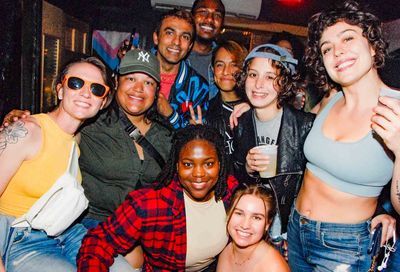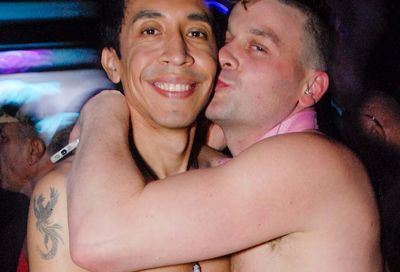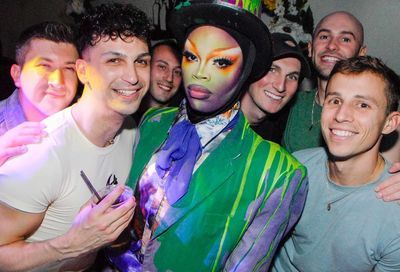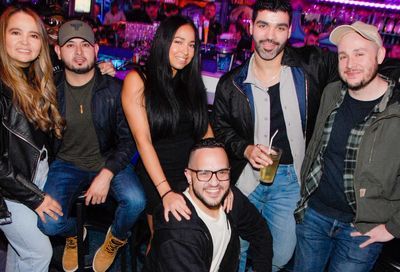Finding Her Voice
Lesbian actress Lucy Newman-Williams comes out as a playwright
“That was Barbra Streisand and Neil Diamond with ‘You Don’t Bring Me Flowers’,” Lucy Newman-Williams coos seductively. “Up next, the Mantovani Orchestra, but first….”
Her voice trails off, and her face lights up with a confident smile. It’s the most comfortable she’s seemed yet during an early morning conversation in the bright, tidy Dupont Circle apartment she shares with her partner, photographer Claire Newman-Williams, a cat, and a dog.
Lucy isn’t joking, really, when she slides effortlessly into the easy listening radio DJ voice while describing her foundation in the entertainment industry. It’s the perfect tone, the exact cadence that was required for her to keep listeners calm and engaged, at least long enough to make it through a commercial break and into another set of soft, popular music paradise.
It’s easy to see why Lucy excelled on the radio airwaves, starting at the age of seventeen in Virginia with a part-time job she landed after a station producer overheard her recording a public service announcement for her high school student government association. It’s easy to see how her voice forged her path — to larger stations while she was in college, to industry awards for advertisements she created using a wide range of voice characterizations, to the acting in television commercials that occupied so much of her professional time in her twenties.
And it’s easy to feel disconcerted, then, when Lucy’s voice stumbles, when she struggles to express herself with the same skill and polish that has earned her reputation as one of Washington’s finest stage actresses — starting with a Helen Hayes Award-nominated performance in Source Theatre’s A Cheever Evening in 1996, and up to a stunning, show-stopping turn at Folger Theatre last fall as Lady Macbeth transplanted to Louisiana circa 1960.
The reason for Lucy’s hesitation is that, with the production of the lesbian coming-of-age play By Tooth or By Tongue now running at Source, her voice is being expressed in a brand new, unfamiliar way: playwriting. But she also co-stars in the two-performer piece, giving it the benefit of her formidable acting skills. And slowly but surely, the more she talks about her newest artistic endeavor, the more apparent it becomes that Lucy Newman-Williams will have a lot to say, with ease to spare, on the stages — and pages — of theatre’s future.
MW: Your background — growing up in rural Virginia in a fundamentalist family, feeling isolated — is not dissimilar to that of your play’s protagonist. How did you transition from that to a career in theatre?
LUCY NEWMAN-WILLIAMS: Since I was five, I’ve always had two ideas: that I liked performing and writing. At that age, performing took on the form of singing in church. My dad got “saved” around that time and then decided he wanted to go into the ministry. Part of that [Church of Christ] culture is that you take your family to all the different churches in the denomination around the state. The new preacher who’s just about to go off to bible college will preach the Sunday night service, and they’ll take up an offering to help him on his way. My dad, the preacher, and mom, the perfect preacher’s wife, made me — quite against my will — sing “Something’s Happened to Daddy.” That’s a big joke between Claire and me now.
MW: Oh dear. Did you have the dreadful soundtrack accompaniment on tape, or did you get one of those jamming-for-Jesus drum/guitar/bass combos to back you up?
NEWMAN-WILLIAMS: [Laughs.] No, just those horrible, out-of-tune church pianos with a zealous, middle-aged “Delores”-type banging on the keys.
MW: Everyone has to start somewhere.
NEWMAN-WILLIAMS: Indeed. Then I took the typical route of doing all the plays in high school, and becoming president of the drama club. I began studying professionally at fifteen in Richmond at the School of Performing Arts, and went on to study theatre in Charlottesville at the University of Virginia, which provides wonderful preparation for a performing arts career.
MW: When did you start coming out?
NEWMAN-WILLIAMS: I always knew I was gay. I had my first girlfriend when I was sixteen, which is petrifying in that kind of community. There’s a very real threat — you’re standing in line for many kinds of danger. After escaping to Charlottesville, you could say I was out from the age of twenty-one. But I didn’t make the commitment to be completely out until 1996 after Claire and I were married in our commitment ceremony. That changed everything for me.
MW: How so?
NEWMAN-WILLIAMS: You know how there are degrees of being out? You can think you’re out, then you’re in a group of people and there’s always that lunch hour. Before my marriage, people would say, “Are you married or seeing anyone?” I would just say, “No.” Of course, you never get to know anyone. I was working in Maine that year, and I remember sitting at dinner, and suddenly, I had the words for it. “Are you married?” “Yes, I am. My partner is a woman, and we consider ourselves to be married.” I called Claire that night and I was like, “You won’t believe this, but I know how to do it now!” Finding the right person, the right relationship, is what makes it possible. It’s about losing fear. You suddenly take the blinders off and look around, and you’re like, “Well, you know what, if that person doesn’t like the idea of what I am or who I love, then that person doesn’t get to be in my life.” I’m not going to thumb my nose at them, but I’m just not going to be afraid anymore.
If I had to stress one thing I did right in my life, it would be actually having a commitment ceremony. When we invest our lives with ritual, we invest our lives with meaning. [Gay people] are still inventing a culture, so we don’t have to completely accept or completely deny any institutions. But have a ceremony. Ceremony is so important. In front of family and friends, stand up and say, “This is important enough to mark, and to hold sacred this union.”
MW: How long have you and Claire been together?
NEWMAN-WILLIAMS: We’ve known each other for fourteen years, and we were always best friends. But we were always with someone else, and she was giving me advice in my love life, and I was giving her advice. Hers was always better. [Laughs.] It’s been eight years that we’ve actually been together. We had a very traditional, old-fashioned courtship, however, because we didn’t move in together until we were married. We like to joke about that, too.
MW: Let’s talk about By Tooth or By Tongue. How is the show going? Are you getting good feedback from audiences?
NEWMAN-WILLIAMS: Because this is my first play, I didn’t even think about response — the way people come to me and tell me how it affects them. That’s been the greatest joy in all of this. There are gay people and straight people alike telling me what the play means to them.
There’s a theme in the play about the idea of stealing yourself back from a culture that tries to make you into something it can use, or categorize. I’ve been delighted to hear from people how that’s not strictly a gay theme. Middle-aged straight women have come up to me and said, “Golly, this play had me thinking about my life and how I became this for this man, and I became this for this person.” That kind of shocked me. I’ve always believed in the power of words, but I’m now actually seeing that idea reinforced.
MW: The play has a very sensual feel to it, though it’s not graphically sexual. What do you find sexy?
NEWMAN-WILLIAMS: Truth is sexy. Natural is sexy. Bravery is sexy. Passion — not just sexual, but passion for living — is sexy. Although I don’t know how much “sexy” matters. What we really mean when we say “sexy” is fundamentally what pulls us, and what’s “sexy” isn’t just sexual. I think there are sexy phrases, and sexy words. The gay and lesbian culture has become defined, in many ways, by sexually-driven stereotypes — the butch leather daddy, the lipstick femme fatale — that don’t even begin to express who we really are. I hope we’re all testing our notions of what our culture is. We’re not just sexual, we have minds, we have families. We need to be a little more responsible in terms of where we are, and where we’re going.
MW: The play has quite a distinctive style and language. It comes across as having a very strong connection to literature. I can definitely hear influences of southern writers like Flannery O’Connor and Carson McCullers. How did you approach it?
NEWMAN-WILLIAMS: It’s funny, I wrote it the only way I knew how to write it. I tap into something primal, maybe it’s the opposite of logical and linear. It’s a little bit dream-like. That’s the internal process. I can probably describe it better after something like my fifth play, not the first. This thing grew like a tree. I didn’t know where that branch was going to go, how tall it was going to be — it grew organically. It’s not a learned thing.
MW: Now that it’s up and running, and “finished” for now, how does the play compare to other works in dramatic literature?
NEWMAN-WILLIAMS: I’m reminded of Tom in Tennessee Williams’s The Glass Menagerie, how he speaks very poetically to the audience. Before my play was produced, more than a few people said it was far too poetic and needed to be changed. But I kept believing in it, and standing up for it, and saying, “Yes, I agree, this feels different than what we hear in theatre today.” But this is the best of what theatre is, people speaking from their souls.
I would venture to say people feel in phrases just like these. The language is seeking to express the colors, and textures, and intimate experience — the utterly private, internal, ugly, exulted. I try to express what goes on inside a person, that place where you are utterly alone. That’s what poetry is. Maybe we usually see it applied with a brush, and here I am applying it with both hands, mucking about in a broader way. Theatre is about blood and guts and anarchy. If it isn’t, it’s no good. It has to go against the grain. It has to get right in somebody’s lap, and actors need to explode into the audience.
MW: Is there a good balance in D.C. theatre right now in terms of what the art form strives for, and what audiences need and want to experience? Are we being well-served by the theatres in this community?
NEWMAN-WILLIAMS: Absolutely. I would like to see more lesbian plays. I’d love to see us build the lesbian theatre-going community, and the only way to do that is to put more lesbian plays out there. I know there are actresses who are lesbians, who want to play lesbians. I’m thirty-six, and until now, I’ve never played a lesbian — a character who understands the particular way my heart works.
That’s what makes Source so great. If you’re an actor and you don’t see the opportunities you want, you can make them for yourself there — write, create, produce them. It’s “The Theatre” — more than other companies — where if your idea is good enough, and you bring it to fruition, that work is likely to be received. You’re more likely to get a “yes” there.
MW: When I interviewed Jeff Keenan recently about the recreation of Actors’ Theatre of Washington as a company focused on the gay, lesbian, bisexual and transgender experience, we were discussing this season’s plays he’s scheduled. There isn’t much, if anything, beyond the “gay” in GLBT. But one of the reasons he cited for that is that there aren’t a lot of lesbian plays. Do you agree with that assessment?
NEWMAN-WILLIAMS: There are women writers out there with work — pieces they’ve finished, pieces they’re working on, ideas they have — and the time for their emergence is happening now. There are a lot of gay male-oriented plays out there, and if I have anything to do with it, there are going to be a lot more lesbian plays out there. Maybe someone will see my play and be like, “Oh my God, well, she did it. Why not me?” I’m encouraging women to write the plays, get them out there. Bring them to Source — bring them to me, I’d love to read them.
MW: It seems that much of the recent popular gay theatre has not only been male-oriented, it’s also generally been pretty light in tone. And here you are, much further across the spectrum with a very “serious” approach. Is the lesbian audience drawn to theatre more by your kind of play, or will every kind of stylistic approach eventually be represented if more lesbians write?
NEWMAN-WILLIAMS: We need it all, just like the food groups. We need serious plays, we need comedy, we need drama, we need good literature. Man — and woman — cannot live on pop culture alone. I don’t think my play is like taking your vitamins. But it does give you something to think about. The next play I write might make everybody laugh, and go home feeling great. I don’t know, but I kind of doubt it. I might just be the sort of person who keeps it a little too close to the broken heart.
Support Metro Weekly’s Journalism
These are challenging times for news organizations. And yet it’s crucial we stay active and provide vital resources and information to both our local readers and the world. So won’t you please take a moment and consider supporting Metro Weekly with a membership? For as little as $5 a month, you can help ensure Metro Weekly magazine and MetroWeekly.com remain free, viable resources as we provide the best, most diverse, culturally-resonant LGBTQ coverage in both the D.C. region and around the world. Memberships come with exclusive perks and discounts, your own personal digital delivery of each week’s magazine (and an archive), access to our Member's Lounge when it launches this fall, and exclusive members-only items like Metro Weekly Membership Mugs and Tote Bags! Check out all our membership levels here and please join us today!




